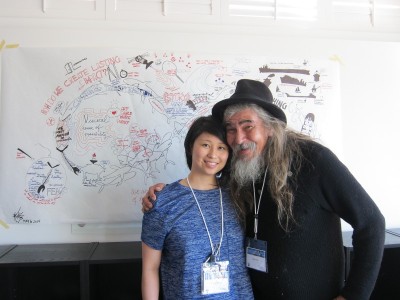 Spaceship Earth - International Roundtable at the Peter Wall Institute for Advanced Studies, Vancouver
Spaceship Earth - International Roundtable at the Peter Wall Institute for Advanced Studies, Vancouver
Between 5 and 9 May 2014, scientists, artists and practitioners met upon the invitation of a group including Mundus maris to discuss possibilities of meeting the challenges of living on our Blue Planet under siege. The participants were driven by the concern to develop new perspectives and space for action. They refused becoming resigned or cynical about the many depressing environmental and social indicators showing the threatened state of the ocean and ecosystems all over the world.
The atmosphere was certainly one of discovery of new perspectives thanks to crossing wires of people from very different backgrounds.
 Infact, the blending of diverse knowledge and fields of experience, which does not often happen among highly specialised people. That was itself a rich source of making fresh sense of the world around us.
Infact, the blending of diverse knowledge and fields of experience, which does not often happen among highly specialised people. That was itself a rich source of making fresh sense of the world around us.
Suspending judgement and listening first to the others and then also deep in oneself are among the key ingredients of discovering new opportunities in old and not so old problems.
As a matter of fact, one learns to go beyond a binary thinking of solving problems to one where the wealth of diverse perspectives opens chances for transformations that can slow the frenetic rush towards exploiting every last bit of "resource" on the planet and thus precipitate collapse and accelerate the joint action on alternatives that provide staying power over the long run. Call it sustainability.
The group that had successfully bid for funding of the roundtable by the Peter Wall Institute for Advanced Studies at the University of British Columbia, Vancouver, Canada, was composed of U. Rashid Sumaila, Director of the Economics Research Unit at the Fisheries Centre at UBC, Cornelia E Nauen, President of Mundus maris - Sciences and Arts for Sustainability, and Sarah K. Meltzoff of the Rosenstiel School of Oceanic and Atmospheric Studies of the University of Miami. It was later joined by Maria Scordialos and Vanessa Reid of The Living Wholeness Institute.
To read a chronicle of the Roundtable from the invitation to the conclusion, click here.








